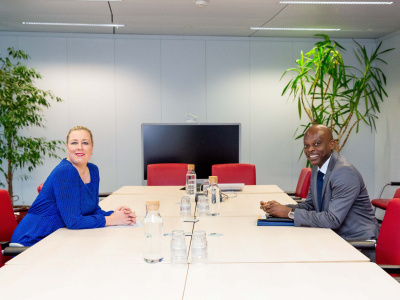
EU Support for Regional Integration and Regional Economic Communities in Africa in Light of the Upcoming 11th EDF
Exclusive article by Commissioner Andris Piebalgs Promoting regional integration has been a long-standing objective of EU development policy and is set to remain so, as the Commission has clearly reiterated its commitment to regional integration in its Agenda for Change – the blueprint for a higher-impact, more results-oriented EU development policy going forward. The EU has been supporting regional integration in sub-Saharan Africa since the Lomé II Convention came into being and I am firmly convinced that it must remain a cornerstone of the 11th European Development Fund (EDF). The EU is obviously a key partner for African, Caribbean and Pacific (ACP) regional organisations and it goes without saying that, thanks to its own experience and close political links with Africa, the EU has both a special responsibility to fulfil in this area and a clear added value to offer. The countries of sub-Saharan Africa have every interest in working together and the EU needs to continue to support the general process of overcoming the obstacles which separate countries from their neighbours. It remains particularly essential in Africa for political stability as well as for economic development and the efficient management of regional public goods. The strategic and policy framework governing EU support for ACP regional integration is defined by the ACP-EU partnership agreement and was last formalised in the Commission Communication of 6 October 2008 on "Regional integration for development in ACP countries" (1) . The main thrusts of the framework remain as relevant and valid as ever; however, at the same time we must learn from recent experiences to define a new approach that will enable us to increase our impact and do more for regional integration. Under the 10th EDF the Regional Indicative Programmes have taken on a new meaning, with the negotiation of Economic Partnership Agreements (EPAs) and the strengthening of the political mandates of African regional organisations. This context has justified a doubling of the regional integration allocation in comparison with the 9th EDF. The bulk of the envelope (75%) has gone into supporting ACP countries' efforts to boost regional economic integration – a focal sector which includes building regional economic organisations' institutional capacity and supporting any policy which contributes to the development of integrated regional markets, and which has also been designed for flanking measures in support of EPA implementation. A second major focal sector of African regional programmes has been support for political cooperation. This sector, in turn, has two main components: first, support for the implementation of the Joint EU-Africa Strategy; and second, support for all regional mechanisms seeking to promote peace and stability, prevent conflict and fight security threats. The signing of the six Regional Indicative Programmes took place later than originally planned, at the end of 2008 (in 2009 for Central Africa). The delay came about because of the complexity of the process, the difficult EPA negotiations and the geographical configuration of the regions, each of which has several regional organisations with partially overlapping memberships. Furthermore, the regional organisations were not sufficiently prepared for a greater role in programming and implementing EU aid – and this with a budget that had doubled. Since these programmes were intended to accompany EPAs, for which negotiations had not yet concluded, a decision was made to identify only very general areas of cooperation, leaving the more detailed programming for a later stage. Notwithstanding the important increase in funds allocated to regional programmes under the 10th EDF, we must acknowledge that, four years later, there has been very limited progress in terms of regional integration in Africa, and the rate of implementation of EU funds remains low. The Cotonou partnership being what it is, the European Union and the African regions share the responsibility for this situation. We have used the mid-term review of the Regional Indicative Programmes as an opportunity to overcome the difficulties in implementing regional strategies. We want to see funds committed as satisfactorily as possible before 31 December 2013 (2) ; that is why services from the European Commission and the European External Action Service (EEAS), together with African regional organisations, have identified relevant and feasible projects with which we can use the lion's share of the funds. In some cases, where there were not enough mature projects available, the remaining funds will be reallocated to the Sustainable Energy for all Initiative. The chief aim of the mid-term review was to improve the focus and put our programming into operation. Our progress in formulating new projects in recent months shows how this wake-up call has led to significant steps towards achieving that aim. The second aim was to draw the best possible lessons for the imminent 11th EDF programming, so as to be able to deal with the challenges of regional integration and cooperation in Africa. From this point of view, the conclusions of the mid-term review are largely in line with the results of the report of the European Court of Auditors in 2009 (3) and confirm the existence of the many challenges faced by African regional integration projects. Of course, such challenges vary from one region to another, but five categories of common problems can be identified: 1. Inadequate mandates of regional organisations, issues of institutional and administrative capacity, lack of legal and policy instruments for effective implementation of mandates. 2. Lack of national ownership of regional integration projects, insufficient mainstreaming of regional integration in national development strategies, strong resistance to the transfer of sovereignty, existence of several regional organisations whose mandates and membership overlap, lack of political will and capacities at national level to translate integration projects into action. 3. Highly fragmented regional markets, poor implementation of economic integration agreements, and coexistence of several incoherent integration programmes. 4. Inadequate economic diversification, strong dependence vis-à-vis a small number of export products and lack of complementarities between national economies. 5. Inefficient interconnections of infrastructure, generating extremely high costs for transport and intra-regional services (including energy), together with excessive or illicit costs for administrative operations, inspections, security controls etc. We must clearly learn from this situation. Accordingly, Commission and EEAS services are working to shape a new approach to the 11th EDF, so that we are not confronted with the same conclusions in 2020. On the one hand, our intention is to continue supporting regional organisations by addressing their core agenda and mandate more directly and by jointly identifying a few key sectors in which we can make a difference together. On the other hand, we feel the need to complement this support by tackling obstacles to regional integration at their very roots: this will involve providing African Member States with the incentive to play a larger role at regional level and to implement their regional commitments, while also ensuring that regional programmes are implemented by the most efficient stakeholders. To this end, EU and African partners should devise results-oriented regional strategies based on specific and limited objectives. The EU should support regional organisations based on a shared, realistic roadmap taking into account their respective mandates, implementation capacities and real added value in terms of nurturing growth and political stability within their respective regions. This support could thus be focused mainly on capacity-building and enhanced coordination in regional organisations. We should furthermore allow national authorising officers, specialist institutions, regional development banks and other relevant technical bodies to be responsible for implementing regional programmes, especially trans-border or national projects with a specific regional dimension. In this way we can be sure that regional programmes are being implemented by the most efficient stakeholders and that there is more coherence between the national and regional levels. Such an approach could also encourage regional organisations' member states to embrace regional integration because they would enjoy direct access to regional funds. To build further on this opportunity, it would be crucial to establish in all regions a monitoring system to provide comprehensive information on the overall regional integration process, including progress in individual countries. The Commission and the EEAS are currently exploring a number of avenues as they work on the regional programming guidelines for the 11th EDF. We are confident that these guidelines will help boost our regional programmes, and thereby improve our contribution to programming dialogue with sub-Saharan African regional economic communities and their member states. Andris Piebalgs is EU Commissioner for Development at the European Commission. Footnotes 1. http://ec.europa.eu/development/icenter/repository/COMM_PDF_COM_2008_604_F_EN_REGIONAL_INTEGRATION.PDF 2. Date of the 10th EDF sunset clause. 3. Special Report 18/2009: Effectiveness of EDF support for Regional Economic Integration in East Africa and West Africa. http://eca.europa.eu/portal/pls/portal/docs/1/8030724.PDF
This article was published in Great Insights Volume 1, Issue 9 (November 2012)
Loading Conversation



